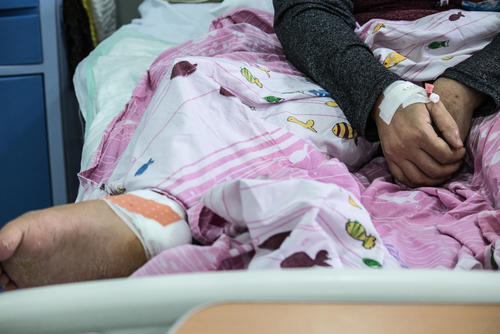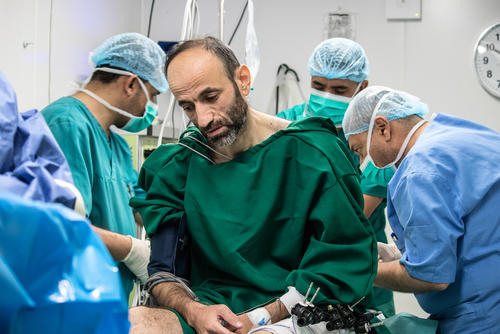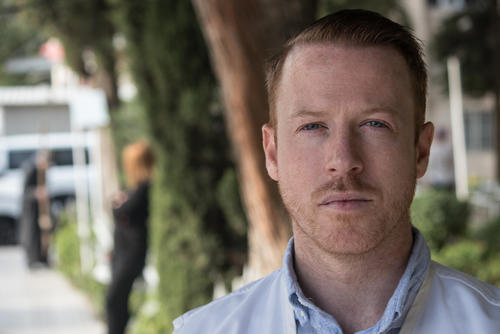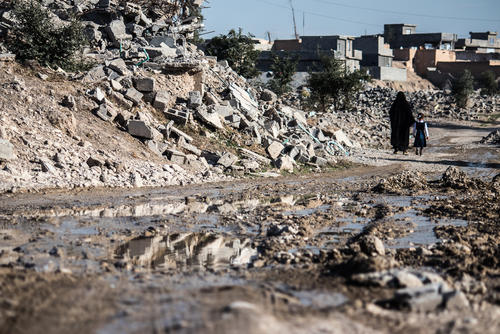Zainab* stepped on an improvised explosive device (IED) in April 2017 as she was running through the streets of Mosul trying to flee fighting between the so-called Islamic State (IS) group and the Iraqi forces. Hours later Zainab woke up in a hospital south of Mosul. She had badly broken her leg and had lost a lot of blood. Over the past year, she has suffered immensely as she has tried to access healthcare in Mosul to fix her broken leg. But in this city still recovering from conflict, healthcare facilities for the war-wounded are scarce. Zainab is now receiving treatment in the Médecins Sans Frontières (MSF) surgery and post-operative care unit in east Mosul. This is her story:
“I live in west Mosul and I'm 45. I have five daughters and two boys. My oldest daughter is in the last grade of high school and most of the others are in high school as well. But my oldest son doesn't go to school. Before the IS came, he was going to school. After they came, he couldn't go anymore and he hasn't gone back since.
When the IS came, we had to flee our home and we moved in with my father. He had a two story house. My parents were living on the second floor and we were on the first floor, with nine people in one room. We still live in that room. It's been four years.
Our family became separated when we fled our home on 11 April 2017. I stepped on an IED and lost consciousness. I woke up in a hospital in Hamman al-Alil [30 kilometres south of Mosul]. The doctors had to give me blood transfusions – about 19 bags of blood in total. Some of my daughters were also injured with shrapnel.
When I woke up in Hamman al-Alil and I realised I was injured, I accepted the reality. I thought about my family and I worried about what had happened to them. But then, I got the news that my family was fine and I was relieved it was only me.
I stayed for a month and four days [in Hamman al-Alil hospital] and they put an external fixation on my leg. They then transferred me to Al Salam hospital [in east Mosul] but they said they couldn't provide treatment, and from there they took me home [back to her father’s house].
When I arrived at home, I didn’t have any medication. But a nurse would come and clean the wound and change the dressing. This went on for a while and the wound got better.
Then, I went to another doctor and he said I needed an operation. He took some bone from one leg and put it in my other leg. After the operation, my bones started degrading and any minor movement would hurt. I still had a fracture in my leg. I visited a private doctor and, from August to September, I saw him regularly. He said I needed another operation because the bone was still fractured and was getting thin.

INT video interview - Field Co - Mosul one year on
The private doctor removed the internal plate that was inside. The wound got better and I was moving around on crutches. But then something happened and I snapped the bone. After that, for two months, we went and saw another private doctor. He did a bone replacement operation and internal fixation. It was a four-hour operation. It cost 1 million IQD ($USD 832). A week after the operation, the wound became infected. The infection came from the hospital – it was dirty and filthy. The doctor prescribed drugs but I didn't get any better. Another doctor then referred me to this MSF post-operative care facility.
After I arrived here, they operated on me. They said the infection was coming from inside from the internal fixation. My wound started oozing and it was all because of the operation the private doctor did for me. The other bone that was inserted into my leg also got infected. They removed the internal fixation, cleaned the wound and took a sample for testing. When the results came back, they prescribed medication.
I've had about 15 operations on my leg so far. When I did the operation with the private doctor, I said it was the last operation, I thought it would be finished. But the operation failed and it started to get infected. Then I came here and I've had two operations, and I still need three more until it's fixed.
The healthcare situation in Mosul is so bad because all the hospitals are destroyed. Since my injury we haven't visited any public hospitals, only private ones.
My injury has changed my whole life, and it has made me and my family exhausted. Each time I have an operation I hope it is the last.”
*Name changed to protect patient privacy.
One year since the conflict in Mosul officially ended, the battle to rebuild the city and people’s lives is far from over. Large swathes of Mosul, particularly in the west, remain destroyed. Mines and booby traps still ensnare homes and health facilities.
Some people with no other option have returned to Mosul and live in their damaged homes, often without water or electricity. Poor hygiene conditions are increasing the risk of disease, and trauma injuries are a regular occurrence as people try to rebuild their houses in dangerous conditions.
Access to healthcare is a daily struggle with nine out of the 13 hospitals damaged in the conflict. The reconstruction of health facilities has been extremely slow and there are still only five beds per 10,000 people, well below the international minimum standards for health service delivery.
As a result, many war-wounded patients in Mosul have endured months of agony waiting for follow-up care. They often received hasty surgery on or behind the frontlines to save their lives, and now they need additional surgery, pain management and physiotherapy to regain use of damaged limbs and muscles, and to avoid losing more or all of their movement. Many people are also in need of urgent mental healthcare as they relive the violent trauma of the past and try to cope with the loss of loved ones.
In 2017, MSF worked in and around Mosul to provide lifesaving services for people caught in the violence. We ran several trauma stabilisation posts in east and west Mosul, and managed four hospitals offering a range of services including emergency and intensive care, surgery and maternal healthcare. MSF currently runs a hospital in west Mosul, specialising in maternal healthcare, paediatrics and emergency room services, and a surgery and post-operative care facility for war-wounded patients in east Mosul. In July, MSF will start providing mental health services in primary healthcare clinics in the east and west of the city.






